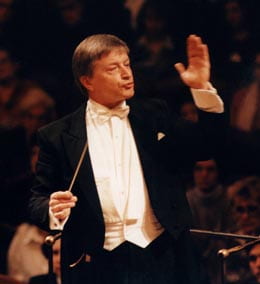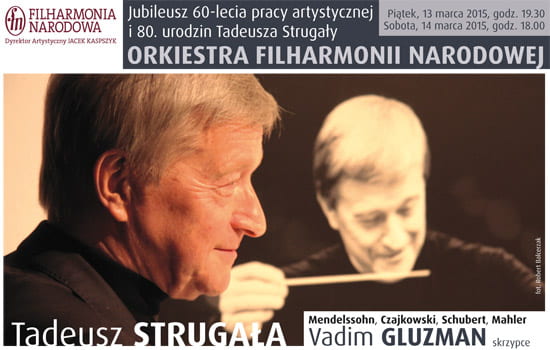by Marek Zebrowski
Maestro Tadeusz Strugała, one of the leading Polish conductors, recently celebrated his 80th birthday and the 60th anniversary of his artistic career. Since 1979 Strugała was associated with the National Philharmonic in Warsaw as its conductor and deputy artistic director. Besides his concert engagements, Maestro Strugała is a noted pedagogue and organizer of musical events throughout Poland.
Recently, Strugała’s long and distinguished career in music has been recognized by two major awards. In October 2014, the Minister of Foreign Affairs awarded Tadeusz Strugała an honorary Bene Merito Badge for “efforts in strengthening of the Polish position in the international arena.” In 2011, Polish Radio bestowed the Diamond Baton Award—one of the most distinguished honors in this field—upon the maestro for his “exceptional artistic creativity, promotion of Polish music in Poland and abroad and bringing it closer to Polish Radio audiences, as well as for achievements in Poland’s and the world’s musical heritage together with the conducting activities that are especially meaningful for the musical scene in Poland.”
 Maestro Strugała is also the recipient of such great honors as the Golden Gloria Artis Medal (pictured at right), L’Ordre du Merite Culturel, the Commanders’ Cross and Star of Polonia Restituta, Kulturpreis Schlesien des Landes Niedersachsen, and the Honorary Doctorate awarded to him by his alma mater, Wrocław Music Academy. Earlier, Strugała was recognized with the Orfeusz Award (1986), Grand Prix du Disque for recordings of works by Franz Liszt (1987), and the Polish Composers’ Union Award (1991). Strugała’s recording of Roman Maciejewski’s Reqiuem was nominated for the Recording of the Year in 1991 by Gramophone, and the 2011 reissue of this CD received the Fryderyk Award. Also in 2011, Fono Forum Magazine gave Strugała the Stern des Monats Award for his Collins Classic disc of works by Scharwenka.
Maestro Strugała is also the recipient of such great honors as the Golden Gloria Artis Medal (pictured at right), L’Ordre du Merite Culturel, the Commanders’ Cross and Star of Polonia Restituta, Kulturpreis Schlesien des Landes Niedersachsen, and the Honorary Doctorate awarded to him by his alma mater, Wrocław Music Academy. Earlier, Strugała was recognized with the Orfeusz Award (1986), Grand Prix du Disque for recordings of works by Franz Liszt (1987), and the Polish Composers’ Union Award (1991). Strugała’s recording of Roman Maciejewski’s Reqiuem was nominated for the Recording of the Year in 1991 by Gramophone, and the 2011 reissue of this CD received the Fryderyk Award. Also in 2011, Fono Forum Magazine gave Strugała the Stern des Monats Award for his Collins Classic disc of works by Scharwenka.
Tadeusz Strugała graduated from Wrocław Music Academy, majoring in theory, composition and conducting. He continued his studies in Weimar and Venice before being appointed the Artistic and Managing Director of the Wrocław Philharmonic during the years 1969-1980. For the 1975-1976 Season, Strugała was also the Artistic and Managing Director of the TV and Radio Orchestra in Katowice and for the next two seasons served in the same capacity for the Presidential Symphony Orchestras in Ankara and Istanbul. Back in Poland, Strugała was Artistic Director of Kraków Philharmonic during the years 1981-1986. For over twenty years, Strugała also held a professorship at the Wrocław Music Academy and since 2007, he serves as professor of conducting at the Kraków Music Academy.
Another aspect of Maestro Strugała’s distinguished service to Polish music is his leadership as Artistic Director of the Chopin Festival in Duszniki-Zdrój (1975-1985), the Wratislavia Cantans Festival (1968-1997), as well as the Wrocław Festival of Polish Contemporary Music.
 Since the early 1960s, Strugała has appeared as guest conductor all across Europe, United States, Australia and Asia, leading touring Polish orchestras and foreign ensembles. Among well over 140 orchestras Maestro Strugała has led so far are such noted ensembles as Bamberger Symphoniker, Berliner Staatskapelle, RIAS Berlin, Rundfunk Sinfonieorchester Berlin, Dresdner Philharmonie, Rundfunk Sinfonieorchester des MDR-Leipzig, Hallé Orchestra in Manchester, St. Petersburg Philharmonic, Helsinki Radio & Philharmonic, Stockholm Radio Symphony, Südwestfunk Baden-Baden Orchestra New World Symphony Orchestra, Norfolk Symphony Orchestra, Tokio Yomiuri Nippon Orchestra, Osaka Philharmonic, Seoul Philharmonic Orchestra, Japan Radio Symphony Orchestra Yamagata, Israel Sinfonietta, City of London Sinfonia, and London Mozart Players.
Since the early 1960s, Strugała has appeared as guest conductor all across Europe, United States, Australia and Asia, leading touring Polish orchestras and foreign ensembles. Among well over 140 orchestras Maestro Strugała has led so far are such noted ensembles as Bamberger Symphoniker, Berliner Staatskapelle, RIAS Berlin, Rundfunk Sinfonieorchester Berlin, Dresdner Philharmonie, Rundfunk Sinfonieorchester des MDR-Leipzig, Hallé Orchestra in Manchester, St. Petersburg Philharmonic, Helsinki Radio & Philharmonic, Stockholm Radio Symphony, Südwestfunk Baden-Baden Orchestra New World Symphony Orchestra, Norfolk Symphony Orchestra, Tokio Yomiuri Nippon Orchestra, Osaka Philharmonic, Seoul Philharmonic Orchestra, Japan Radio Symphony Orchestra Yamagata, Israel Sinfonietta, City of London Sinfonia, and London Mozart Players.
In addition to his philharmonic concerts, Maestro Strugała often leads operatic performances in Warsaw, St. Petersburg, Graz, and has also appeared in the closing scenes of Polanski’s film, The Pianist, and recorded the film’s soundtrack, featuring music by Wojciech Kilar.
In private life, Tadeusz Strugała’s many interests include drawings and paintings as well as collecting historical conductors’ batons. His collection of them now exceeds 100 items and has been exhibited in Poland and abroad.
The National Philharmonic in Warsaw celebrated this extraordinary artist’s double jubilee with a weekend of concerts held on March 13 and 14, featuring music by Tchaikovsky, Schubert and Mahler. Violinist Vadim Guzman joined Maestro Strugała for a performance of Mendelssohn’s Violin Concerto while the Laureate himself led the ensemble in Schubert’s Fourth Symphony, Tchaikovsky’s Romeo and Juliet Fantasy Overture, and Mahler’s famous Adagietto that rounded off the program.
[Sources: polskieradio.pl]
